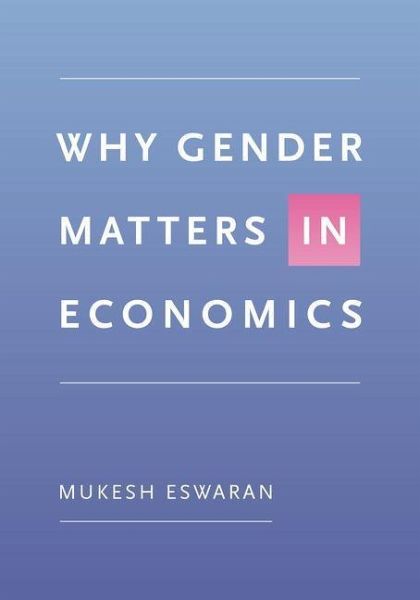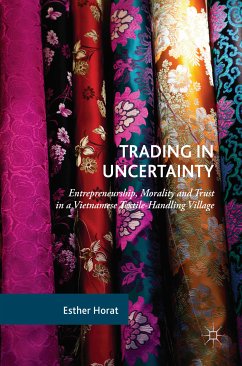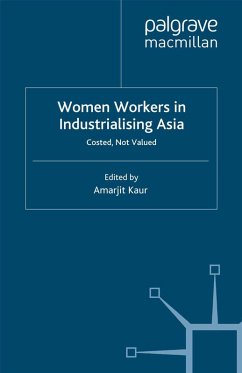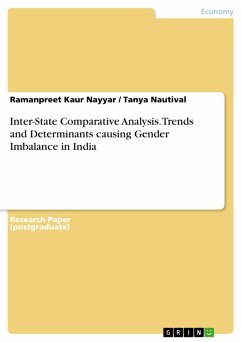
Why Gender Matters in Economics (eBook, PDF)
Versandkostenfrei!
Sofort per Download lieferbar
42,95 €
inkl. MwSt.
Weitere Ausgaben:

PAYBACK Punkte
21 °P sammeln!
An economic way of thinking about the gender issues confronting women around the worldGender matters in economics-for even with today's technology, fertility choices, market opportunities, and improved social norms, economic outcomes for women remain markedly worse than for men. Drawing on insights from feminism, postmodernism, psychology, evolutionary biology, Marxism, and politics, this textbook provides a rigorous economic look at issues confronting women throughout the world-including nonmarket scenarios, such as marriage, family, fertility choice, and bargaining within households, as well...
An economic way of thinking about the gender issues confronting women around the world
Gender matters in economics-for even with today's technology, fertility choices, market opportunities, and improved social norms, economic outcomes for women remain markedly worse than for men. Drawing on insights from feminism, postmodernism, psychology, evolutionary biology, Marxism, and politics, this textbook provides a rigorous economic look at issues confronting women throughout the world-including nonmarket scenarios, such as marriage, family, fertility choice, and bargaining within households, as well as market areas, like those pertaining to labor and credit markets and globalization.
Mukesh Eswaran examines how women's behavioral responses in economic situations and their bargaining power within the household differ from those of men. Eswaran then delves into the far-reaching consequences of these differences in both market and nonmarket domains. The author considers how women may be discriminated against in labor and credit markets, how their family and market circumstances interact, and how globalization has influenced their lives. Eswaran also investigates how women have been empowered through access to education, credit, healthcare, and birth control; changes in ownership laws; the acquisition of suffrage; and political representation. Throughout, Eswaran applies sound economic analysis and new modeling approaches, and each chapter concludes with exercises and discussion questions.
This textbook gives readers the necessary tools for thinking about gender from an economic perspective.
Gender matters in economics-for even with today's technology, fertility choices, market opportunities, and improved social norms, economic outcomes for women remain markedly worse than for men. Drawing on insights from feminism, postmodernism, psychology, evolutionary biology, Marxism, and politics, this textbook provides a rigorous economic look at issues confronting women throughout the world-including nonmarket scenarios, such as marriage, family, fertility choice, and bargaining within households, as well as market areas, like those pertaining to labor and credit markets and globalization.
Mukesh Eswaran examines how women's behavioral responses in economic situations and their bargaining power within the household differ from those of men. Eswaran then delves into the far-reaching consequences of these differences in both market and nonmarket domains. The author considers how women may be discriminated against in labor and credit markets, how their family and market circumstances interact, and how globalization has influenced their lives. Eswaran also investigates how women have been empowered through access to education, credit, healthcare, and birth control; changes in ownership laws; the acquisition of suffrage; and political representation. Throughout, Eswaran applies sound economic analysis and new modeling approaches, and each chapter concludes with exercises and discussion questions.
This textbook gives readers the necessary tools for thinking about gender from an economic perspective.
- Addresses economic issues for women throughout the world, in both developed and developing countries
- Looks at both market and nonmarket domains
- Requires only a background in basic economic principles
- Includes the most recent research on the economics of gender in a range of areas
- Concludes each chapter with exercises and discussion questions
Dieser Download kann aus rechtlichen Gründen nur mit Rechnungsadresse in A, B, BG, CY, CZ, D, DK, EW, E, FIN, F, GR, HR, H, IRL, I, LT, L, LR, M, NL, PL, P, R, S, SLO, SK ausgeliefert werden.













